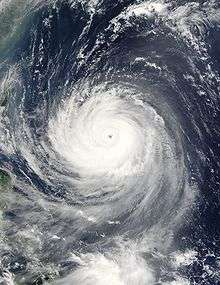Definify.com
Webster 1913 Edition
Typhoon
Ty-phoon′
,Noun.
[Earlier
tuffoon
, tuffon
, Pg. tufão
, Ar. tufān
a violent storm; probably fr. Gr. τυφῶν
, τυφῶς
, a violent whirlwind, that rushes upward from the earth, whirling clouds of dust (cf. Typhus
); or perhaps from Chin. t’ai-fung
a cyclonic wind.] A violent whirlwind; specifically, a violent whirlwind occurring in the Chinese seas.
Definition 2026
typhoon
typhoon
English

A typhoon.
Noun
typhoon (plural typhoons)
- A weather phenomenon in the Eastern Pacific that is precisely equivalent to a hurricane, which results in wind speeds of 64 knots (118km/h) or above. Equivalent to a cyclone in the Indian Ocean and Indonesia/Australia.
- World War II aircraft, Hawker typhoon.
- A Eurofighter Typhoon.
Derived terms
Translations
hurricane in the Pacific
|
|
See also
References
- ↑ Thomas Hickock's translation of The voyage and trauell of M. Caesar Fredericke, Marchant of Venice, into the East India, and beyond the Indies: "concerning which Touffon ye are to vnderstand, that in the East Indies often times, there are not stormes as in other countreys; but euery 10. or 12. yeeres there are such tempests and stormes, that it is a thing incredible, but to those that haue seene it, neither do they know certainly what yeere they wil come." (“typhoon” in Douglas Harper, Online Etymology Dictionary (2001).)
- ↑ Frederick Hirth, The word "Typhoon," its history and origin, in The Journal of the Royal Geographical Society (1880), discusses the presence of words with roughly this sound and meaning in Chinese, Arabic, Persian, Hindi and Greek — and uncertainty about which language it derives from — and notes the early Portuguese attestation.
- 1 2 The Arabic Contributions to the English Language: An Historical Dictionary by Garland Hampton Cannon and Alan S. Kaye considers typhoon "a special case, transmitted by Cantonese, from Arabic, but ultimately deriving from Greek. [...] The Chinese applied the [Greek] concept to a rather different wind [...]"
- ↑ Andrew Delahunty, From Bonbon to Cha-cha: Oxford Dictionary of Foreign Words and Phrases
- ↑ Tai Whan Kim, The Portuguese Element in Japanese: A Critical Survey (1976): several points suggest that the Portuguese word came from the Arabic, not from Chinese tai-fung ...
- ↑ F. Corriente Dictionary of Arabic and Allied Loanwords. Spanish, Portuguese, Catalan, Galician and Kindred Dialects (2008), page 457a: tifò (Ct.), tifón (Cs.) and tufão (Pt.): was prob. first acquired by Pt. during the initial explorations of the Indian Ocean, < Ar. ṭūfān "flood; hurricane", and phonetically contaminated by Gr. typhṓn, name of the mythical monster causing volcano eruptions and hurricanes.